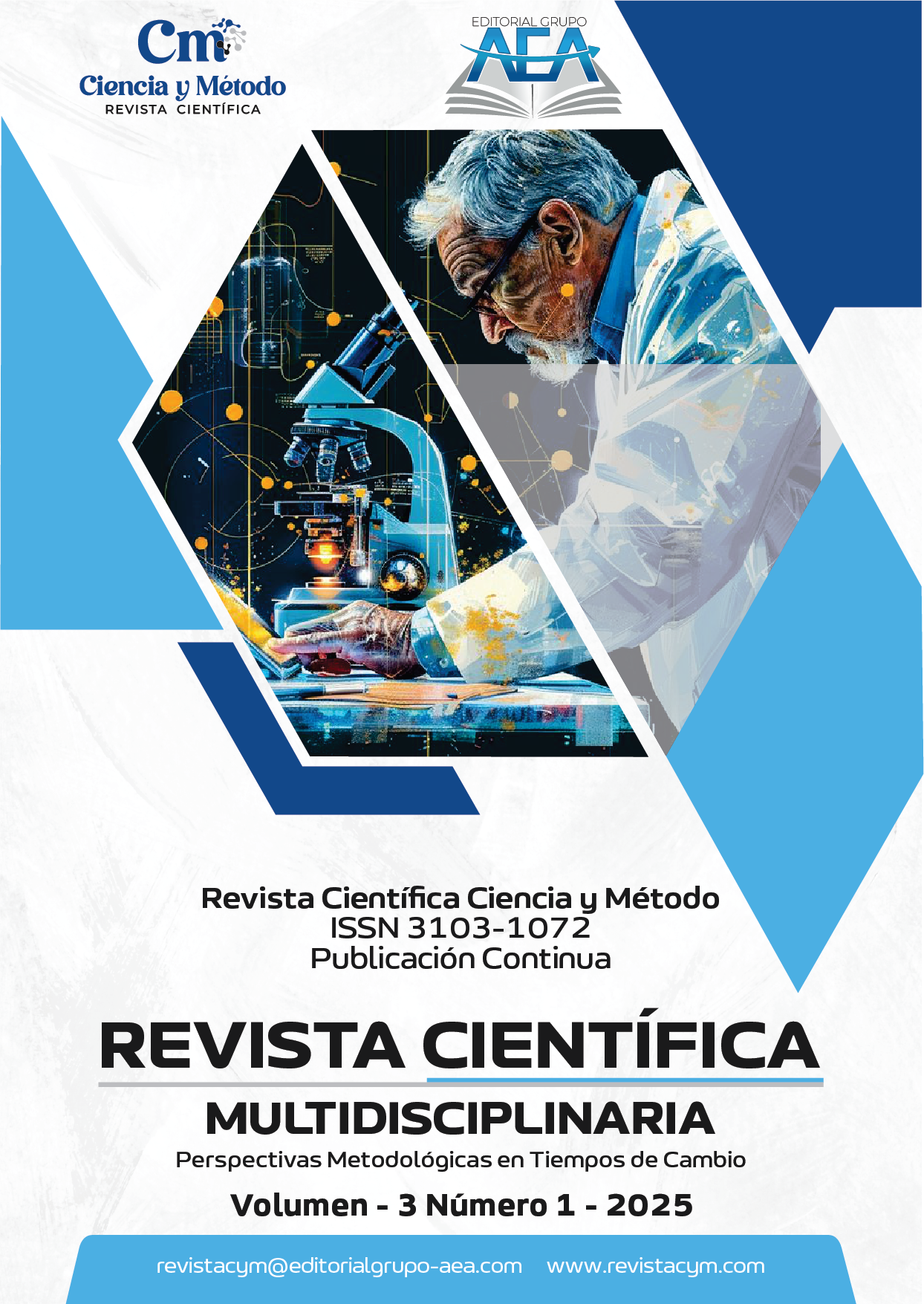The role of educational leadership in the implementation of inclusive policies in schools
Main Article Content
Abstract
The study analyzes the role of educational leadership in the implementation of inclusive policies in school institutions, in a context of growing diversity and demand for educational equity. Through an exploratory literature review approach, research published in the last two decades in high-impact databases was systematized, prioritizing studies that addressed factors, practices and barriers associated with school inclusion. The findings reveal that transformative leadership with a shared vision and continuous teacher training are decisive factors in consolidating inclusive environments, while cultural resistance to change and the scarcity of material and human resources are persistent structural barriers that limit the sustainability of these policies. The discussion highlights the tension between inclusive rhetoric and traditional school practices, as well as the need to rethink inclusion as a collective process of cultural transformation and redistribution of opportunities. It is concluded that inclusive leadership requires comprehensive policies that combine sustained investment, professional accompaniment and legitimate institutional frameworks, so that inclusion does not depend solely on individual motivation, but on systemic conditions that make it viable and enduring.
Downloads
Article Details
Section

This work is licensed under a Creative Commons Attribution-NonCommercial 4.0 International License.
How to Cite
References
Ainscow, M., & Sandill, A. (2010). Developing inclusive education systems: The role of organisational cultures and leadership. International Journal of Inclusive Education, 14(4), 401–416. https://doi.org/10.1080/13603110802504903 DOI: https://doi.org/10.1080/13603110802504903
Ainscow, M., Booth, T., & Dyson, A. (2006). Improving schools, developing inclusion. Routledge. DOI: https://doi.org/10.4324/9780203967157
Avilez-Figueroa, C. M., Apráez-Márquez, S. X., Herrera-Enríquez, V. N., Guiscasho-Chicaiza, D. R., & Gualoto-Díaz, M. C. (2024). Estrategias innovadoras para fomentar el pensamiento crítico en niños de educación preescolar a través de la ciencia. Journal of Economic and Social Science Research, 4(4), 56–72. https://doi.org/10.55813/gaea/jessr/v4/n4/132 DOI: https://doi.org/10.55813/gaea/jessr/v4/n4/132
Casanova-Villalba, C. I., Herrera-Sánchez, M. J., Bravo-Bravo, I. F., & Barba-Mosquera, A. E. (2024). Transformación de universidades incubadoras a creadoras directas de empresas Spin-Off. Revista De Ciencias Sociales, 30(2), 305-319. https://doi.org/10.31876/rcs.v30i2.41911 DOI: https://doi.org/10.31876/rcs.v30i2.41911
Devecchi, C., Dettori, F., Doveston, M., Sedgwick, P., & Jament, J. (2012). Inclusive classrooms in Italy and England: The role of teachers’ attitudes and expertise. European Journal of Special Needs Education, 27(2), 171–184. https://doi.org/10.1080/08856257.2011.645587 DOI: https://doi.org/10.1080/08856257.2011.645587
Florian, L. (2014). What counts as evidence of inclusive education? European Journal of Special Needs Education, 29(3), 286–294. https://doi.org/10.1080/08856257.2014.933551 DOI: https://doi.org/10.1080/08856257.2014.933551
Florian, L., & Black-Hawkins, K. (2011). Exploring inclusive pedagogy. British Educational Research Journal, 37(5), 813–828. DOI: https://doi.org/10.1080/01411926.2010.501096
Grandes-Padilla, J. G., Duque-Sánchez, P. J., Barrionuevo-Montalvo, H. P., & Casa-Chicaiza, M. A. (2024). Guía de Aprendizaje Matemático para Adultos con Escolaridad Inconclusa. Editorial Grupo AEA. https://doi.org/10.55813/egaea.l.74 DOI: https://doi.org/10.55813/egaea.l.74
Harris, A., & Jones, M. (2015). Transforming education systems: Comparative and critical perspectives on school leadership. Asia Pacific Journal of Education, 35(3), 311–318. https://doi.org/10.1080/02188791.2015.1056590 DOI: https://doi.org/10.1080/02188791.2015.1056590
Herrera-Enríquez, G., Herrera-Sánchez, M., Casanova-Villalba, C., Puyol-Cortez, J.,
Mendoza-Armijos, H, (2021). Manual para Elaboración del Plan de Titulación como Conclusión de Carrera. Editorial Grupo Compás.
Herrera-Enríquez, V. N., Ilaquiche-Toaquiza, M. O., Mendoza-Armijos, H. E., & Bonilla-Morejón, D. M. (2023). Estrategias de aprendizaje híbrido para mejorar la equidad educativa en zonas rurales. Revista Científica Ciencia Y Método, 1(1), 55-69. https://doi.org/10.55813/gaea/rcym/v1/n1/10 DOI: https://doi.org/10.55813/gaea/rcym/v1/n1/10
Leithwood, K., & Jantzi, D. (2006). Transformational school leadership for large-scale reform: Effects on students, teachers, and their classroom practices. School Effectiveness and School Improvement, 17(2), 201–227. https://doi.org/10.1080/09243450600565829 DOI: https://doi.org/10.1080/09243450600565829
Mendoza-Armijos, H. E., & Rivadeneira-Moreira, J. C. (2023). Análisis de la relación entre el uso de dispositivos digitales y el rendimiento académico en matemáticas. Revista Científica Ciencia Y Método, 1(2), 43-57. https://doi.org/10.55813/gaea/rcym/v1/n2/14 DOI: https://doi.org/10.55813/gaea/rcym/v1/n2/14
Montalvo-Vergara, M. S., Salazar-Vergara, L. del C., Maliza-Muñoz, W. F., & Tapia-Bastidas, T. (2025). Uso de la tecnología asistiva en la enseñanza de niños con autismo. Revista Científica Zambos, 4(2), 38-53. https://doi.org/10.69484/rcz/v4/n2/107 DOI: https://doi.org/10.69484/rcz/v4/n2/107
Mulford, B., & Silins, H. (2003). Leadership for organizational learning and improved student outcomes—What do we know? Cambridge Journal of Education, 33(2), 175–195. https://doi.org/10.1080/0305764032000081344 DOI: https://doi.org/10.1080/03057640302041
Murtagh, L. (2010). Meeting the needs of children with special educational needs in Irish mainstream schools. European Journal of Special Needs Education, 25(2), 159–173.
Puyol-Cortez, J. L., & Piedra-Castro, W. I. (2023). Evaluación del impacto de la educación emocional en el rendimiento académico en adolescentes. Revista Científica Ciencia Y Método, 1(1), 42-54. https://doi.org/10.55813/gaea/rcym/v1/n1/9 DOI: https://doi.org/10.55813/gaea/rcym/v1/n1/9
Puyol-Cortez, J. L., Casanova-Villalba, C. I., Herrera-Sánchez, M. J., & Rivadeneira-Moreira, J. C. (2024). REVISIÓN METODOLÓGICA AG2C PARA LA ENSEÑANZA DEL ÁLGEBRA BÁSICA A ESTUDIANTES CON DISCALCULIA. Perfiles, 1(32), 15-27. https://doi.org/10.47187/perf.v1i32.280 DOI: https://doi.org/10.47187/perf.v1i32.280
Ramírez-Solórzano, F. L., & Herrera-Navas, C. D. . (2024). Inclusión Educativa: Desafíos y Oportunidades para la Educación de Estudiantes con Necesidades Especiales. Revista Científica Zambos, 3(3), 44-63. https://doi.org/10.69484/rcz/v3/n3/57 DOI: https://doi.org/10.69484/rcz/v3/n3/57
Rosero-Cardenas, W. I., Ruiz-Gaona, P. G., Sislema-López, R. N., Tocagon-Cabascango, J. F., & Tituaña-Sánchez, L. G. (2024). El Futuro del Aprendizaje: Preparando a los Estudiantes de Primaria para el Mundo Digital. Journal of Economic and Social Science Research, 4(4), 73–88. https://doi.org/10.55813/gaea/jessr/v4/n4/133 DOI: https://doi.org/10.55813/gaea/jessr/v4/n4/133
Ruiz-Sánchez, C. I., Herrera-Feijoo, R. J., & Herrera-Jácome, D. F. (2024). Análisis integral de los riesgos ergonómicos y psicosociales en el contexto educativo. Editorial Grupo AEA. https://doi.org/10.55813/egaea.l.96 DOI: https://doi.org/10.55813/egaea.l.96
Ryan, J. (2006). Inclusive leadership and social justice for schools. Leadership and Policy in Schools, 5(1), 3–17. https://doi.org/10.1080/15700760500483995 DOI: https://doi.org/10.1080/15700760500483995
Saavedra-Mera, K. A., Valverde-Medina, L. M., Caicedo-Perlaza, L. C., & Puyol-Cortez, J. L. (2024). El estudio de la termodinámica química desde una perspectiva pedagógica. Journal of Economic and Social Science Research, 4(3), 89–104. https://doi.org/10.55813/gaea/jessr/v4/n3/122 DOI: https://doi.org/10.55813/gaea/jessr/v4/n3/122
Santander-Salmon, E. S. (2024). Métodos pedagógicos innovadores: Una revisión de las mejores prácticas actuales. Revista Científica Zambos, 3(1), 73-90. https://doi.org/10.69484/rcz/v3/n1/13 DOI: https://doi.org/10.69484/rcz/v3/n1/13
Slee, R. (2011). The irregular school: Exclusion, schooling and inclusive education. Routledge. DOI: https://doi.org/10.4324/9780203831564
UNESCO. (2017). A guide for ensuring inclusion and equity in education. Paris: UNESCO. https://unesdoc.unesco.org/ark:/48223/pf0000248254





